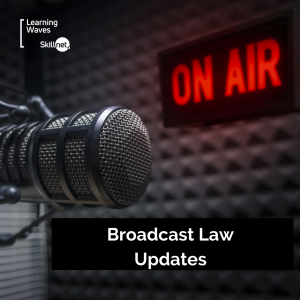Learning Waves partners with Headline to deliver training for Journalists covering Burnout, Vicarious Trauma and Compassion Fatigue.
Learning Waves is delighted to partner with Headline to deliver a series of workshops supporting the mental health of journalists and other media professionals. The first of its kind in Ireland, this training will focus on the practical and effective management of vicarious trauma and burnout in the news industry, delivered by industry expert Michele Grant. The workshops are designed specifically for any professional working in factual programming and online or print news production who is exposed to traumatic content in the course of their work. Owing to the unprecedented challenges and potential traumas associated with working on the frontline during Covid-19, the need is now greater than ever for journalists to equip themselves with the tools to tackle issues such as burnout, vicarious trauma and compassion fatigue.
The workshops will be offered at both manager/editor and reporter-level to allow for adequate peer support and privacy within groups. It also means the unique challenges faced by both groups are highlighted and addressed in the training. Media professionals potentially affected by vicarious trauma include those working as reporters, editors, photographers, camera operators, researchers, producers and those working in ingest and on picture desk duties.
The Course
Vicarious trauma, also known as secondary trauma, is a potential outcome of exposure to the traumatic experiences of others. This can be a result of reading or seeing distressing material or scenes or interviewing individuals who recount their experiences of extreme distress. Other work roles commonly affected include social workers, community workers, human rights lawyers and court administrators.
Vicarious trauma may be sudden or gradual. It may be preceded by general stress and compassion fatigue. The training focuses on teaching participants about how stress and vicarious trauma arise in the course of news production. It covers what is normal, how to self-monitor, how to put protections in place and how to undertake peer-to-peer support. Read more from the DART Center on Journalism and Trauma here. [Link to: Covering Trauma: Impact on Journalists – Dart Center]
This is a two-part workshop and participants must be available for both parts. The course is scheduled to take place on 21st and 28th October 2021 and full details are available on our Training Calendar page.
Trainer
The workshop will be facilitated by Michele Grant specialises in coaching and training with a focus on resilience in the workplace. She holds a TRiM (Trauma Risk In Management) certificate which is the protocol widely used by the military, emergency services and news organisations. She is a member of the UK Psychological Trauma Society and the European Society for Psychological Stress Studies. She is co-author of Working on the Digital Frontline a trauma guide for journalists. Her specialist training is a compulsory element for the masters programme in Human Rights Law at Essex University. She has also trained human rights law students at Cambridge University and frontline community workers in the east end of London. Michele is an ICF accredited coach at PCC level and trained in coaching supervision at Oxford Brookes University. She is also qualified to teach Mindfulness-based Cognitive Therapy through the Oxford Mindfulness Centre, part of the University of Oxford Dept. of Psychiatry. She has worked in local government and the BBC (where she was Executive Vice President for News & Sport, US) and has delivered workplace resilience training and leadership resilience for a number of local authorities.




